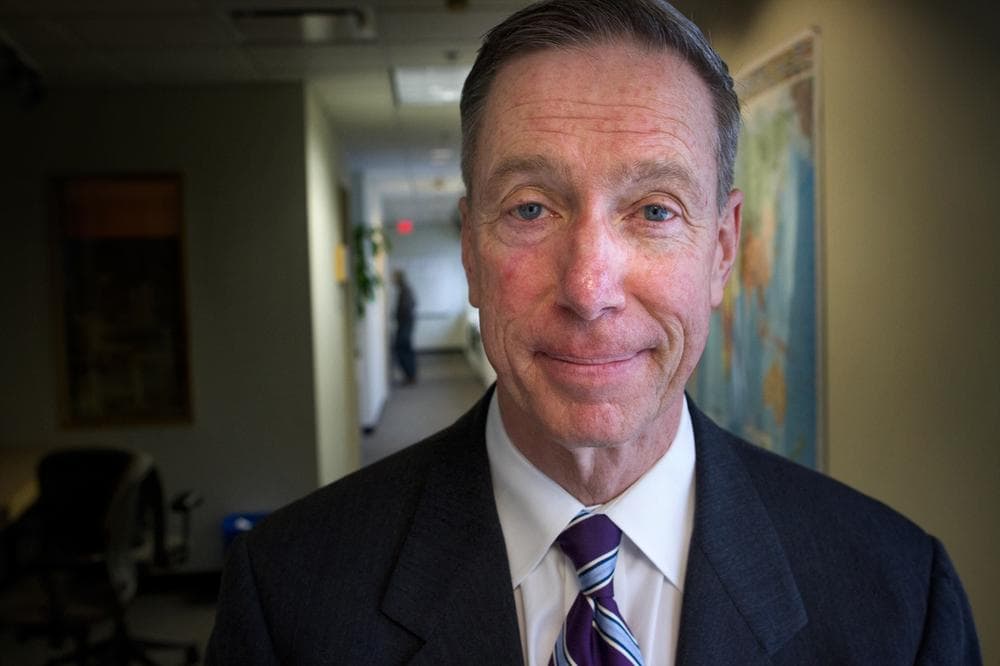Advertisement
Democratic Senate Candidate Lynch Has Beaten The Odds Before
ResumeOn Jan. 31, Congressman Stephen Lynch, of South Boston, launched his campaign for the U.S. Senate at the union hall for the Iron Workers Local 7 in South Boston.
"We are just a very short distance from the Old Colony housing projects, where my mom and dad and my five sisters and I lived in a small three-bedroom apartment — one bathroom, five sisters," Lynch told the audience. "Spent most of my time waiting to use the bathroom. We lived there for 15 years and that's really the beginning of my story."
Lynch said growing up all he ever wanted to be was an iron worker like his father. Now, Lynch wants to become the next U.S. senator from Massachusetts.
Long Odds Are Nothing New
Lynch began his campaign against long odds. His rival in the Democratic primary, Congressman Edward Markey, of Malden, is better financed and ahead in the polls.
But state Rep. Marty Walsh, who represents Dorchester, a part of Lynch's congressional district, pointed out that Lynch has always prevailed against the political odds.
"Anything he's run for, he has been the underdog, the guy who can't win," Walsh said. "I've been on opposite sides of him in a race when he ran for state Senate here in South Boston many years ago. He just works hard. He outworks people. He has a great story."
At the union hall, Lynch told that story. He said growing up in the projects in South Boston shaped his world view.

"I learned that affordable housing isn't just a government program," Lynch said. "It was my home, and not just my home, but the home for a lot of families that are struggling."
Lynch is still a dues-paying member of the Iron Workers Local 7. He says his path as an iron worker was neither smooth nor straight.
"I remember working in a night shift over at Quincy shipyard, General Dynamics, as a welder, and I remember the company had massive layoffs because of foreign competition and they finally closed that plant down and I found myself in the unemployment line," Lynch said. "I also worked for a while at General Motors' plant in Framingham."
Shortly after Lynch arrived, he said, GM closed the plant.
"Sometimes, there are forces in our global economy that throw workers out of work and place families in a tough spot," he said. "I know what it's like to stand in an unemployment line. It's something that you never forget, that feeling of insecurity, especially if you have a family relying on you."
Lynch, 58, and his wife, Margaret, have one daughter.
Lynch says being unemployed taught him that in severe economic times, sometimes only government can provide relief.
"I also learned that misguided trade policies can create incentives for corporations to move jobs overseas, just to exploit low-wage workers and lax environmental standards and regulations," Lynch said. "And I learned that those aren't just trade agreements, it's someone's job. It was my job."
Lynch, who attended South Boston High School, Wentworth Institute of Technology and Boston College Law School, says education has been the key to his life.
"Education has propelled every forward step that I have taken from the Old Colony projects to the halls of Congress," Lynch said.
In 1994, Lynch made the transition from iron worker to politics when he was elected state representative. Lynch boiled down his campaign message to this essence: "I will not fit in in the United States Senate, but neither would you."
A Lone Voice
Lynch has sometimes been a lone voice in the state's congressional delegation. From 2002 to 2006, he was the only member of Congress from Massachusetts to vote against allowing women in the military to have abortions at overseas military hospitals, even if they paid for it themselves. But he makes clear that repealing Roe v. Wade is not part of his agenda.
"I have never seen the repeal of Roe v. Wade as part of any solution, so I have not worked at that," Lynch told reporters at his campaign launch. "On the other hand, I have actually stood on the floor of the House and defended funding for Planned Parenthood to try to get counseling money and birth control funding and contraceptive access for women who don't want to get pregnant. I think that's the way you reduce abortion, is reduce unwanted pregnancies."
Lynch was also the lone vote from Massachusetts against final passage of President Obama's Affordable Care Act, or "Obamacare."
Perfect Conditions?
2001 was an important year for Lynch's career and his personal life. He donated half his liver to his brother-in-law and later that year won election to the U.S. House. The Democratic primary took place on 9/11, while most people in Massachusetts were glued to their television sets. Marty Walsh points out that Lynch won that primary thanks to his South Boston base, which rallied behind him to push him ahead in a field of nine candidates.
"The race was about neighborhood to neighborhood, street to street," Walsh said. "And if you remember, on Election Day it was Sept. 11, and Stephen that day had the people prepared, the army prepared to get people out to vote."
Similar conditions apply now. It's a special election and the state's attention has been consumed by the Boston Marathon bombings. There's not a lot of appetite for politics.
But last year, Lynch was the biggest vote-getter of the state's nine members of the U.S. House of Representatives. Perfect conditions, perhaps, for the iron worker who grew up in the projects of South Boston to surprise everyone once again.
This program aired on April 25, 2013.
